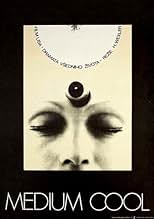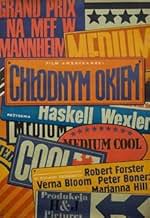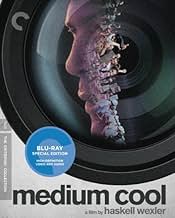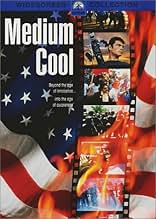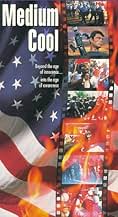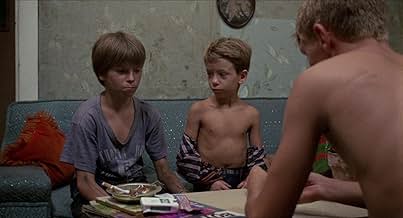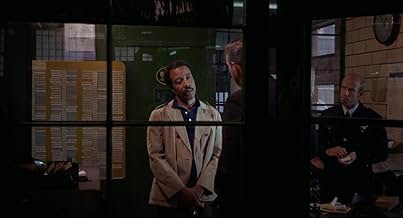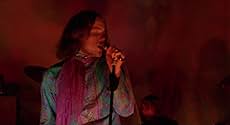Un reportero de televisión se ve personalmente involucrado en la violencia que estalla durante la Convención Nacional Democrática de 1968.Un reportero de televisión se ve personalmente involucrado en la violencia que estalla durante la Convención Nacional Democrática de 1968.Un reportero de televisión se ve personalmente involucrado en la violencia que estalla durante la Convención Nacional Democrática de 1968.
- Dirección
- Guionista
- Elenco
- Premios
- 2 premios ganados y 4 nominaciones en total
- Dirección
- Guionista
- Todo el elenco y el equipo
- Producción, taquilla y más en IMDbPro
Opiniones destacadas
Haskell Wexler, a cinematographer by trade, practically invented the technique invented we know today as "cinema verite" with this striking drama that plays so much like a documentary, you'd never guess it was fiction without being told. It's less a story and more a voyeuristic look into the lives of ordinary people thrust into extraordinary circumstances, in this case reporters who are covering a political convention and other Chicago locals who are just minding their own business when the legendary riots break out at the 1968 Democratic National Convention.
Even more groundbreaking is the approach Wexler takes in framing the film's final scenes. He had ample warning that there would potentially be some unrest at the convention, so he decided to thrust his cast right into the thick of it, sending them to the foyer and front entrance of the Chicago Convention Center and the crew right along to film the events. No one knew exactly what would happen, making this perhaps the most creative and timely piece of "improvised" drama in the history of filmmaking up to this point.
Every documentary filmmaker who chooses to make his/her film about actions and events rather than simply a bunch of talking heads owes a debt to Wexler and his creative team on "Medium Cool".
Even more groundbreaking is the approach Wexler takes in framing the film's final scenes. He had ample warning that there would potentially be some unrest at the convention, so he decided to thrust his cast right into the thick of it, sending them to the foyer and front entrance of the Chicago Convention Center and the crew right along to film the events. No one knew exactly what would happen, making this perhaps the most creative and timely piece of "improvised" drama in the history of filmmaking up to this point.
Every documentary filmmaker who chooses to make his/her film about actions and events rather than simply a bunch of talking heads owes a debt to Wexler and his creative team on "Medium Cool".
They really don't make movies like this anymore. A documentary-style look at the press and media - fascinating! Stylings are very "'60s-ish" but the story and conversations will never grow outdated! A very influential film, expertly constructed and directed by Haskell...good luck finding it on video. You'll have better luck waiting for it to air on television.
The acting is very good, and convincing. Sometimes I wondered whether they were _really_ actors at all! The direction is shaky and utterly superb, capturing the "feel" of these sort of documentaries broadcast on "60 Minutes," etc.
All in all a very fascinating look at the media during the 1960s and beyond. It still relates. Vietnam has passed but the media is still the same!
The acting is very good, and convincing. Sometimes I wondered whether they were _really_ actors at all! The direction is shaky and utterly superb, capturing the "feel" of these sort of documentaries broadcast on "60 Minutes," etc.
All in all a very fascinating look at the media during the 1960s and beyond. It still relates. Vietnam has passed but the media is still the same!
Movies have a way of capturing the moment better than recreating it. I can only dread what a recreated 1968 in Chicago would look like from a Hollywood perspective. It would probably resemble something out of Forrest Gump. But Medium Cool happened to capture some brutal fight scenes with police in Chicago as well as scenes from the black ghettos. You can't recreate this stuff. This isn't a documentary but cinema verité and combines fiction and non-fictional elements. It's all shot with Chicago of 68 in the background. A landmark and infamous year for the US with the assassinations of RFK and MLK as well as the 1968 Democratic National Convention which was met with severe state repression. The state wasn't negotiating at this time, it was brutally sending men off to war and attacking those at home with the hired goons of the police force.
It's a great movie which manages to combine fiction and non-fiction and shows us what the sixties were really like. It wasn't all love beads and LSD, although there is an amusing psychedelic sequence which takes place in a club.
I think what I liked most was that even people who were non-political were being dragged into the politics of the time. Events were that serious at the time and people had to begin picking sides, the pleasant, white, middle-class interior of the Chicago DNC or outside fighting and raging against the police.
It's a great movie which manages to combine fiction and non-fiction and shows us what the sixties were really like. It wasn't all love beads and LSD, although there is an amusing psychedelic sequence which takes place in a club.
I think what I liked most was that even people who were non-political were being dragged into the politics of the time. Events were that serious at the time and people had to begin picking sides, the pleasant, white, middle-class interior of the Chicago DNC or outside fighting and raging against the police.
Interesting approach to revealing the world of photo-journalism, news journalism, and political activism, conceived and directed by awardwinning cinematographer Haskell Wexler. Fictional narrative features a Chicago TV news crew intertwined with actual news footage in and around the Democratic Convention of 1968.
There is a good balance between the fiction and non-fiction elements in as much as Wexler attempts to make his point. The fictional story line (a love story) is real enough to keep us watching and deflective enough to make the harsh realities of the non-fiction elements palatable.
Attention to detail defines Medium Cool as a very personal film for Wexler. There definitely is a political perspective. Second and third viewings will call attention to painstaking perfectionism in construction of shots, timing, and pace--the subject matter and cinematic approach (low budget, hand-held, docu-style) may suggest a `student film' so don't be confused. This is an extremely well-crafted highly professional product. Nice interjects of great era-defining music compliment the visuals.
Inventive, some say ground-breaking, certainly well worth watching.
There is a good balance between the fiction and non-fiction elements in as much as Wexler attempts to make his point. The fictional story line (a love story) is real enough to keep us watching and deflective enough to make the harsh realities of the non-fiction elements palatable.
Attention to detail defines Medium Cool as a very personal film for Wexler. There definitely is a political perspective. Second and third viewings will call attention to painstaking perfectionism in construction of shots, timing, and pace--the subject matter and cinematic approach (low budget, hand-held, docu-style) may suggest a `student film' so don't be confused. This is an extremely well-crafted highly professional product. Nice interjects of great era-defining music compliment the visuals.
Inventive, some say ground-breaking, certainly well worth watching.
A brilliant film and a seminal one - a product by a major Hollywood studio handled in cinema-verite' style; besides, the various issues it raises - social, political and media-related - have scarcely been treated with such directness and power. The lack of star names in the cast (Peter Boyle, who appears briefly, was not yet established and, even if he had debuted in John Huston's REFLECTIONS IN A GOLDEN EYE [1967], lead Robert Forster's role was originally intended for John Cassavetes) certainly helps sell its inherent documentary feel.
Though, understandably, most meaningful to people who witnessed these turbulent times first-hand, and Americans in particular, despite its specific time-setting - Chicago 1968 (partly shot at the actual Democrats convention site, the film proved prophetic because the script involved riots breaking out...which is what actually happened!) - many of its concerns are still very much with us!! Fascinating therefore if slightly overlong - the subplot involving Verna Bloom and Harold Blankenship feels a bit like padding at first (and was actually what remained of a proposed film, with animal interest, about a poor country boy's adjustment to city life!)...but, ultimately, its point is made during the film's latter stages when Bloom goes to look for her missing son - creating an indelible image of a perplexed figure (incongruously dressed in a bright yellow outfit) getting embroiled in all the commotion hitting the streets at that same moment. This, however, results in a goof involving the unexplained presence very early on of Bloom (already wearing the yellow dress but whose introduction proper in the film takes place quite a bit later!) at a cocktail party for members of the press - a sequence intended to immediately precede the riots but which was then pushed forward during editing, so as to deal straight off with the film's major theme of media responsibility! The tragic yet ironic ending - presented as matter-of-factly as any of the news items covered by dispassionate TV cameraman Forster - is very effective.
This is certainly renowned cinematographer Wexler's most significant directorial effort; his camera-work (some of it hand-held) is simply incredible, as is Paul Golding's editing (which must have been quite a headache and, in fact, he mentions in the Audio Commentary that several scenes remained on the cutting-room floor; pity they weren't available for inclusion on the Paramount DVD - nor, apparently, were the rights to the 2001 documentary about the film, LOOK OUT HASKELL, IT'S REAL: THE MAKING OF 'MEDIUM COOL'!). Also essential to the unique texture of the film is the fantastic soundtrack (mostly by Mike Bloomfield but also featuring songs by Frank Zappa, among others).
Though, understandably, most meaningful to people who witnessed these turbulent times first-hand, and Americans in particular, despite its specific time-setting - Chicago 1968 (partly shot at the actual Democrats convention site, the film proved prophetic because the script involved riots breaking out...which is what actually happened!) - many of its concerns are still very much with us!! Fascinating therefore if slightly overlong - the subplot involving Verna Bloom and Harold Blankenship feels a bit like padding at first (and was actually what remained of a proposed film, with animal interest, about a poor country boy's adjustment to city life!)...but, ultimately, its point is made during the film's latter stages when Bloom goes to look for her missing son - creating an indelible image of a perplexed figure (incongruously dressed in a bright yellow outfit) getting embroiled in all the commotion hitting the streets at that same moment. This, however, results in a goof involving the unexplained presence very early on of Bloom (already wearing the yellow dress but whose introduction proper in the film takes place quite a bit later!) at a cocktail party for members of the press - a sequence intended to immediately precede the riots but which was then pushed forward during editing, so as to deal straight off with the film's major theme of media responsibility! The tragic yet ironic ending - presented as matter-of-factly as any of the news items covered by dispassionate TV cameraman Forster - is very effective.
This is certainly renowned cinematographer Wexler's most significant directorial effort; his camera-work (some of it hand-held) is simply incredible, as is Paul Golding's editing (which must have been quite a headache and, in fact, he mentions in the Audio Commentary that several scenes remained on the cutting-room floor; pity they weren't available for inclusion on the Paramount DVD - nor, apparently, were the rights to the 2001 documentary about the film, LOOK OUT HASKELL, IT'S REAL: THE MAKING OF 'MEDIUM COOL'!). Also essential to the unique texture of the film is the fantastic soundtrack (mostly by Mike Bloomfield but also featuring songs by Frank Zappa, among others).
¿Sabías que…?
- TriviaThe line "Look out, Haskell, it's real!" was actually dubbed in after the shooting. It was supposedly what Haskell Wexler was thinking to himself and he wanted to include it.
- ErroresWhen Eileen enters the L looks for Harold, she is wearing a white hair band, but when they show her sitting on the L, the hair band is missing.
- Citas
John Cassellis: If I gotta be afraid in order for your argument to work, then you got no argument.
- Créditos curiososStuds Terkel is credited as "Our Man in Chicago".
- Versiones alternativasDue to copyright disputes, all video releases feature some different songs on the soundtrack from the theatrical version.
- ConexionesEdited into The Kid Stays in the Picture (2002)
- Bandas sonorasSweet Georgia Brown
by Ben Bernie, Kenneth Casey and Maceo Pinkard
Performed by Brother Bones
Courtesy of Tempo Records
Played during roller derby scene
Selecciones populares
Inicia sesión para calificar y agrega a la lista de videos para obtener recomendaciones personalizadas
- How long is Medium Cool?Con tecnología de Alexa
Detalles
Taquilla
- Presupuesto
- USD 800,000 (estimado)
- Tiempo de ejecución1 hora 51 minutos
- Mezcla de sonido
- Relación de aspecto
- 1.85 : 1
Contribuir a esta página
Sugiere una edición o agrega el contenido que falta

Principales brechas de datos
By what name was Medium Cool (1969) officially released in India in English?
Responda

